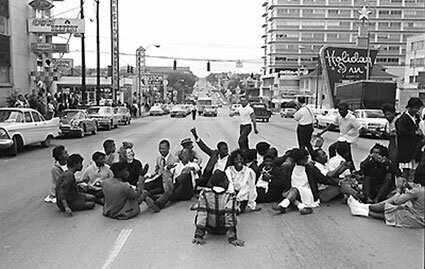 |
 |
 |
|
|
|
||||||||||||||||
| Email Article | Printable Page |
Nashville to Document Its Civil Rights History
 |
|
Photo credit: The Meter
Blacks and whites demonstrate on April 27, 1964, in the middle of Nashville's West End Avenue outside Morrison's Cafeteria.
|
“Most people don’t know that the first sit-ins in Nashville occurred in 1870 during Reconstruction,” says David Price, a graduate student at Middle Tennessee State University.
Likewise, the story of the 1905 Nashville streetcar boycotts is relatively unknown, compared with the Nashville student movement of the 1960s, which primarily involved students from Tennessee State and Fisk universities.
The Nashville Civil Rights Movement Survey Project, which Price leads on behalf of the Middle Tennessee State University Center for Historic Preservation, is starting a database of historic information displayed on Nashville's high schools, churches, business buildings and other sites where protests, sit-ins and other non-violent presentations took place.
“The goal of this project is to identify and honor places that still remain in Nashville that were significant sites of civil rights events,” Price said.
The survey project is working with the Tennessee Preservation Trust to help educate the Nashville community about the significant role the city played in the success of the movement.
According to the Preservation Trust, Nashville’s non-violent protests served as one of the most influential catalysts for similar movements across the South.
Coordinators of the project said they see their work as a creative way to examine and document some of the most critical times in the nation’s history.
“Most literature only documents high-profile sit-ins and protests that took place during the modern civil rights movement,” Price said.
Specific sites to be included are the formerly all-white East High School, whose exclusion of blacks became the subject of Kelley v. Board of Education, a federal court case that led to Nashville's acceptance of the U.S. Supreme Court's 1954 Brown v. Board of Education decision; the former First Baptist Church, now First Baptist Church Capitol Hill, where Dr. James Lawson trained student activists for the sit-ins that would lead to the desegregation of lunch counters and other businesses; and the Metropolitan Courthouse, formerly Nashville City Hall, where Fisk student leader Diane Nash fought for the desegregation of lunch counters.
“We are hoping to be finished with the survey by mid-December,” Price said, "but the publicized materials and public programs we would like to initiate will take a little while longer.”
A comprehensive list of the chosen sites, along with historical information and public education materials, are to be made public through a speech- and slide-show presentation at the Tennessee Preservation Trust 5th annual conference in Nashville April 15-16.
“Students should get involved in learning about the survey project for individual education and for the betterment of their universities as wholes,” said Jamie Riley, a Tennessee State University graduate student and former president of the TSU chapter of the National Association for the Advancement of Colored People.
“TSU students don’t always get a chance to express their civil rights sentiments, so I definitely think our students as well as Fisk students should be inspired to learn about the roles of black students in Nashville’s history.”
For more information on the Nashville Civil Rights Movement Survey Project, contact David Price at (615) 259-2289.
Posted Nov. 21, 2003
In News
Young People 18-24 Targeted in Get-Out-the-Vote Drives
Class of '08 Arrives at Howard
| Home | News | Sports | Culture | Voices | Images | Projects | About Us Copyright © 2004 Black College Wire. Black College Wire is a project of the Black College Communication Association and the Robert C. Maynard Institute for Journalism Education. |